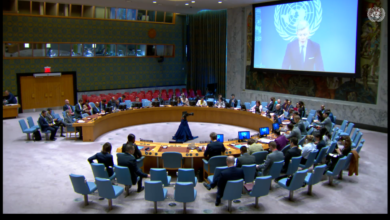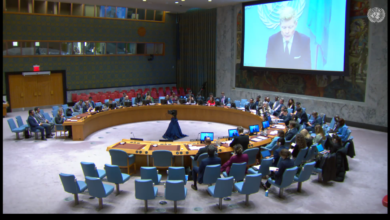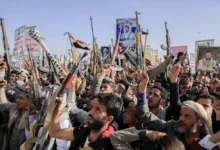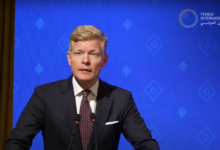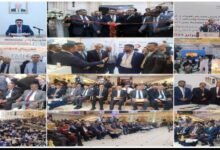United Nations security council calls for immediate halt to fighting in Yemen

SMA NEWS – New York
UN Urging Parties in Yemen to Make Concessions, Conclude Peace Deal, Briefers Caution Security Council of Impending Humanitarian, Ecological Catastrophes
Relentless military escalation by the Houthis “Ansar Allah” in Yemen’s northern Marib region, along with import restrictions at Hudaydah, the closure of Sana’a International Airport and the absence of a political process are depriving people of hope that an end to the conflict is possible, the chief United Nations mediator told the Security Council today, calling on parties to make the concessions needed to conclude a peace deal.
“Taking the decision to end the conflict and open the door to peace is the most consequential choice any party can make,” said Martin Griffiths, the Secretary-General’s Special Envoy for Yemen, as he updated the Council on recent developments. He warned, however, that opportunities currently on the table might not be available later. “I cannot re-emphasize enough what is at stake in Marib,” he said, pointing to Ansar Allah’s offensive, ongoing for more than a year, that has caused an astonishing loss of life, overwhelming fear among internally displaced persons and a disruption of peace efforts. Reiterating his call on Ansar Allah to immediately stop its attack, he said the longer the Marib offensive continues, the greater the risks to Yemen’s broader stability and social cohesion, possibly causing the conflict to spill into areas that have remained mercifully far from the fighting.
To be sure, he said, options on the table would allow for the peaceful resolution of key issues, including lifting restrictions on the flow of commercial goods through Hudaydah port and Sana’a International Airport. Emphasizing that Yemen cannot be governed effectively without inclusive partnerships, he said the way to end the conflict is through an inclusive negotiated political settlement. Since March 2020, he said he has conducted multiple rounds of intensive and complex negotiations with each side. While the terms of the deal have undergone many revisions, all proposals would have achieved a commitment to a nationwide ceasefire, providing immense humanitarian relief and allowing for the opening of roads in Taiz, Hudaydah and Marib. “Civilians suffer the most from the weaponization of the economy,” he said, a fact laid bare in Ansar Allah-controlled areas, where severe fuel shortages are impacting hospitals, food supply and more. The terms also would have included a commitment to resume the political process.
“A deal is still very much possible,” he said, pointing to strong international backing and regional momentum for United Nations efforts. Moreover, the parties’ differences on the issues under negotiation are bridgeable. He pressed key political leaders to heed the calls of the Yemeni people and the international community, including this Council, and to make the compromises necessary to end the fighting. In the coming weeks, he said he will work to conclude negotiations on a deal to stop the fighting, address critical humanitarian issues and resume the political process. He requested greater international support for this endeavour, stressing that if needed, he will call on parties to meet face-to-face to chart a path forward. “I cannot force the parties to negotiate,” he insisted. “That is their duty to the people of Yemen.”
Also briefing the Council, Mark Lowcock, Under-Secretary-General for Humanitarian Affairs and Emergency Relief Coordinator, said Yemen is “trapped in a relentless downward spiral”, with 5 million people just a step away from starving and COVID-19 still surging, pushing the health-care system to collapse. “Famine, disease and other miseries are not simply ‘happening’ in Yemen,” he clarified. The war is imposing them. The Marib offensive and subsequent shelling, air and missile strikes have had an impact on civilians, but the risks ahead are much bigger: 25,000 people have fled, and if the fighting does not stop, up to 385,000 people could be displaced in the coming months. The violence has also fueled escalations in Hajjah, Hudaydah and Taiz, he said, emphasizing that: “We need a nationwide ceasefire right now.”
Calling for further humanitarian access, he said a promising step has been that regulations issued by local authorities on the Red Sea coast, which have stalled aid deliveries for almost 500,000 people, have been suspended until the end of the year. Despite working with Ansar Allah to sustain progress in the North, cargo movements are still delayed and interference with programme management is hampering efforts to help people in areas under its control. While aid agencies race to stop famine, providing emergency food assistance to nearly 9 million people, they are also racing to stop COVID-19. A vaccination drive begun in Government-controlled areas, where health workers have administered about 19,000 doses, is “obviously a small beginning”, he said, adding more vaccines are needed.
Meanwhile, the funding situation is “racing towards a fiscal cliff”, he said, with the United Nations response plan only 34 per cent funded. By September, food aid could be reduced for 6 million people, with cuts facing water and sanitation services, COVID-19 activities, health programmes and support for people fleeing conflict. The threat of economic collapse, which is accelerating the risk of famine, can be assuaged by strengthening the Yemeni rial, which is still trading near record lows. The recent pledge of oil derivatives worth $422 million by Saudi Arabia to the Government of Yemen over the coming year should help relieve pressure on Yemen’s foreign reserves.
While it is crucial to ensure a stable, adequate flow of commercial imports through all ports, he said fuel imports through Hudaydah have plummeted. From January to April, only 200,000 metric tons of fuel entered Hudaydah, and six vessels – all cleared by the United Nations inspection mechanism – are still waiting outside Hudaydah for docking permission from the Government. Until the parties find a solution to differences over import revenue, Yemen will continue to see fuel shortages that inflate prices for food, water and everything else, while cutting into basic services. The most crucial need is peace, he said. “The war is ultimately behind the risk of famine, the spread of disease and economic collapse,” he warned, adding that measures on the negotiation table, including a ceasefire and opening the ports and the Sana’a airport, would go a long way towards alleviating people’s suffering.
In the ensuing debate, delegates called for an immediate end to violence in Marib, highlighting that a nationwide ceasefire is urgently needed and urging the parties to demonstrate a genuine willingness to engage in negotiations. Some agreed that “fair” proposals have been put on the table and urged external parties with influence to help to advance the process. Some also denounced attacks against civilian infrastructure in Saudi Arabia and commended both that Government and Oman for their stated commitments to foster peace in Yemen.
The representative of Yemen called for peace in his country, based on the agreed national, regional and international terms of reference, Gulf Cooperation Council initiatives and the outcomes of both the national dialogue and resolution 2216 (2015). In contrast, Houthi militias have only chosen war, he said, which explains their intransigence in the face of efforts by the Government, United Nations and Saudi Arabia. In Marib, they have targeted civilians using ballistic missiles, drones and improvised explosive devices, he said, calling it “inconceivable” that they would choose peace while receiving support from Iran’s “rogue regime”. He pointed to the recent weapons shipment intercepted by the United States fleet in this regard, contravening resolutions 2216 (2015), among others, and destabilizing the region.
“Statements, condemnations and unclear positions are not enough,” he assured. He urged the Council to exert pressure on the Houthis to stop the Marib offensive and to take all necessary steps to end the humanitarian suffering — starting with the implementation of a ceasefire and submitting to a peaceful solution, as agreed by the Yemeni people and by the national and international communities. For its part, the Government will continue to support all international peace efforts, including by the Special Envoys of the United Nations and the United States, according to the political terms of reference.
Highlighting further concerns, he said the Marib offensive has forced thousands of people to flee their camps, and the Houthis have destroyed water tanks and wells and set tents alight. Urging the Council to exert pressure on the Houthis to stop this violence, he likewise reiterated the call to Yemen’s development partners to redouble donations and to transfer them through the central bank in order to support the economy. It is also important to review the Group of Experts’ report outlining the crime committed by the Houthis in shutting the airport. The Council must prevent impunity, currently being enjoyed by the perpetrators of this crime, and conduct an investigation into crimes committed by the Houthis against African migrants. It also should exert maximum pressure to prevent the Safer oil tanker from being used for political extortion and allow the United Nations inspection team to conduct necessary assessments.
The representative of the United Kingdom said the Houthis’ commitment to peace has been put to the test in light of Saudi Arabia’s statement of support for a nationwide ceasefire, negotiations and the lifting of port and airport restrictions. “As things stand, they are failing this test,” he said. By refusing to meet the Special Envoy in Muscat or to allow him to travel to Sana’a, they have passed up a vital opportunity to demonstrate their readiness to work towards peace. If the Houthis were serious, they would cease their offensive on Marib, remove their restrictions on humanitarian access, stop recruiting children to fight, accept COVAX vaccines and give the United Nations mission the formal written permissions to assess and repair the Safer tanker. Expressing support for a strong Yemen, free from external interference and with an inclusive Government, he said a nationwide ceasefire and peace talks are the only way to achieve this objective.
The representative of Tunisia condemned the ongoing offensive in Yemen, which is complicating any possible solution to the conflict and exacerbating the suffering of people who have already endured so much. The situation requires a ceasefire and resumption of negotiations based on the Gulf Cooperation Council initiative. Further condemning ongoing Houthi attacks on Saudi Arabia’s oil and civilian facilities, he said that parties must protect civilians and infrastructure, urging them to begin a comprehensive ceasefire. He expressed concern over the deteriorating health situation under the spread of COVID-19, calling for hindrances to airport access to be lifted. United Nations experts must be permitted to inspect the Safer oil tanker, he said, as it may lead to an environmental and humanitarian disaster.
The representative of the Russian Federation expressed regret over the virtual format of the meeting, as nothing prevents Council Members from gathering in the Chamber while observing social distancing guidelines. Concerned over ongoing attacks on civilian facilities in Marib, he said all parties must comply with international humanitarian law and seek a diplomatic settlement to the conflict, welcoming Saudi Arabia’s proposals for a peaceful resolution. Noting the importance of lifting blockages to sea, air and land access and the improving humanitarian situation in Yemen, he also encouraged Ansar Allah to compromise on differences with other parties. While providing humanitarian assistance remains a top priority, the funding gap will threaten food security and access to water and medical services. He therefore urged donors to ramp up support, while emphasizing that the provision of assistance must not be politically biased.
The representative of India called for an immediate nationwide ceasefire starting in Marib, where civilians continue to bear the brunt of unabated fighting in front-line areas. The conflict also jeopardizes the governate’s position as a prominent center of economic activity, potentially exacerbating Yemen’s dire economic situation. While the return of the joint cabinet to Aden was a major milestone in implementing the Riyadh Agreement, he noted recent developments in the South are cause for concern. Meanwhile, ongoing fighting in Hudaydah between Yemeni armed forces and Ansar Allah risks unraveling the Stockholm Agreement, which will have serious economic and humanitarian consequences. Millions of people depend on imports from Yemen’s Red Sea ports, a lifeline even more vital now as famine-like conditions have returned, in particular during the pandemic. He urged both parties to fulfill their commitments under the Stockholm Agreement, including through participation in the Redeployment Coordination Committee.
The representative of France welcomed efforts by the United States and Saudi Arabia to end the conflict, pressing the Houthis to stop refusing to talk with the Special Envoy and to end both the Marib offensive and the recruitment and use of children on the front lines. She renewed France’s appeal to review the conclusions of the relevant working group. The Houthis must accept a diplomatic settlement, whose terms are well known: a nationwide ceasefire, reopening of airports and discussions aimed at an inclusive solution, in which women and youth must play their part. The Council must be ready to take measures if no progress is achieved in the coming days. She called on the Houthis to allow access to the Safer oil tanker or otherwise take responsibility for an ecological catastrophe. Their obstruction must stop, she said, calling on them to act responsibly. Efforts also must be intensified to address a large-scale famine and cope with COVID-19, she said, stressing that all parties must respect international humanitarian law and that the protection of civilians must remain an imperative.
The representative of Viet Nam expressed grave concern over military escalations and cross-border fighting, with increased casualties in many places, especially in Marib. All parties must cease military hostilities and accept the United Nations-led peace proposal, while ensuring and promoting the inclusion of women in the political process. About 80 per cent of Yemen’s population is in dire need of protection, shelter and medical support, and more than 16 million people are facing food insecurity and 4 million have been made homeless, 73 per cent of which are women and children. In addition, every two hours, one woman dies during childbirth from preventable causes. “Against this backdrop, it is imperative to provide a safe and smooth passageway for humanitarian aid in Yemen and ensure access to basic services for those in need,” he said. Citing the environmental risks posed by the Safer oil tanker, he urged Ansar Allah to honour their commitments on the matter, granting the United Nations technical team immediate access to carry out necessary assessments.
The representative of Estonia expressed deep concern over the military escalation in Yemen, urging all parties to immediately end the hostilities. “There is no military solution to this conflict,” he said, condemning the continued assault on Marib by the Houthis. While welcoming the start of United Nations humanitarian flights to the region, he said nearly 20,000 people have been displaced since February. He encouraged the parties to engage with diplomatic efforts by the Special Envoy, United States and Oman, show willingness to compromise and agree to a nationwide ceasefire. He likewise urged them to advance agreements for prisoner exchanges and reiterated the call for the Government and the Southern Transitional Council to implement the Riyadh Agreement.
The representative of Ireland called on the Houthis to end their offensive on Marib, which is “quite simply deplorable”, with hostilities inflicting death and misery on the civilian population. Children have been recruited, homes have been destroyed, and 25,000 Yemenis have been displaced due to the violence. The most vulnerable in Marib face extremely difficult conditions, she noted, with mothers, children and pregnant women unable to safely access emergency pediatric and maternal care. She expressed concern over bureaucratic impediments to humanitarian aid, as the assistance is a vital lifeline for millions of Yemenis each month, including those facing dire threats of famine. All parties must adhere to obligations under international humanitarian and human rights law and enable the rapid, safe and unimpeded delivery of aid. Expressing support for all efforts to ensure an inclusive Yemeni-led and Yemeni-owned political process, she called on the parties to the conflict to ensure that women comprise at least 30 per cent of their delegations in all future talks and negotiations.
The representative of Kenya raised several maritime security concerns, pointing to the interception of an illicit arms shipment in international waters off the North Arabian Sea as a worrying sign that armed groups could be exploiting gaps created by military confrontations. Also of grave concern is the increasing number of suspicious attacks using water borne improvised explosive devices and piracy against civilian and commercial ships, posing an immediate threat to peace in the Middle East and the Horn of Africa. He called on the Council to urgently consider measures to secure the Red Sea and the Gulf of Aden. He urged all parties to commit to peace and end the fighting, and condemned all violence and terrorism targeting civilian and commercial infrastructure in Saudi Arabia. Imploring parties to “give dialogue a chance”, he called for adequate, predictable funding to support humanitarian operations and for greater international efforts to fight COVID-19 in Yemen.
The representative of the United States, expressing an unwavering commitment to use diplomacy to end the war, said her country’s Special Envoy spent the week with the United Nations Special Envoy working with the parties in Muscat and Riyadh, as well as with officials from Saudi Arabia and Yemen. There is a “fair deal” on the table, involving a comprehensive ceasefire and inclusive political talks. While urgent action on the ports and airport is needed, a nationwide ceasefire offers the only hope to restore peace. Stressing that the Houthis passed up a major opportunity by refusing to meet with the United Nations Special Envoy, she said the violence must stop immediately, especially against sites outside Marib for internally displaced persons. “A resolution becomes exponentially harder when one side is committed to a military solution and rejects negotiations; right now, the Houthis seem to have no interest in peace,” she asserted. She called on them to allow the United Nations access to the Safer tanker. On the upside, there is stronger international and regional consensus on ending the war “than ever before”, she said, pointing to Saudi Arabia’s announced commitment to end the conflict, in line with the United Nations proposal. Also, Oman is playing an important role in facilitating talks. The Houthis must “stop standing in the way of peace”, she said, adding that all parties must permit the free flow of commercial and humanitarian commodities. Otherwise, it is hard to imagine how much more difficult it will become for the people of Yemen.
The representative of Norway welcomed news of recent prisoner exchanges in Marib, facilitated by local mediators, reflecting Yemenis’ genuine desire for peace. Yet, she expressed deep regret that a nationwide ceasefire has not been agreed upon and that the humanitarian crisis and fighting continue unabated. “At least 90 children have been killed since January,” she said, also expressing concern over reports that fighting is affecting internally displaced persons and civilian areas, mainly in Marib, but also in Hajjah and Hudaydah. She underscored the urgent need to ensure food and fuel supplies, expressing deep concern also over reports that starvation is being used as a weapon. She called for the lifting of the sea blockade and an immediate reversal of all restrictions on humanitarian actors. She also expressed shock over claims that Houthis are blocking water access to Taiz and over the treatment of journalists. She urged all, especially key actors in the region, to use their leverage with the parties. The Riyadh Agreement and establishment of a unity Government are crucial steps for peace to take root.
The representative of Niger said there is no military solution to the crisis, which requires frank talks between all parties. He called upon the Houthis to seize the current opportunity and respond to Saudi Arabia’s ceasefire proposal. The show of confidence in ending hostilities, opening ports and releasing detainees can bring all parties back to the negotiation table, he said. It is crucial to lift the blockade of Hudaydah port and Sana’a International Airport and to release aid that Yemenis depend upon, as that assistance must not be used for political purposes, especially under the impending threat of famine. He welcomed delivery of the first COVAX vaccines, as the programme can lead to reopening Yemen and breathe new life into its economy.
The representative of Saint Vincent and the Grenadines called for an immediate ceasefire, with the parties focusing on inclusive negotiations towards peace in a Yemeni-led and Yemeni-owned process. She noted the dire humanitarian situation has been compounded and exacerbated by the COVID-19 pandemic, the deteriorating economic situation, increased hostilities and a “palpable gap” in the global aid budget. More than 20 million people in Yemen rely on life-saving humanitarian assistance, and almost half of children under age 5 will suffer from malnutrition, including 400,000 who may die without urgent treatment. “The parties in Yemen have not only a moral obligation to ensure the delivery of aid, but a legal obligation to do so,” she said. Noting the grave environmental threat posed by the Safer oil tanker, she said promises by the international community including regional States, and the parties in Yemen “can no longer be merely ventilated, but must translate into concrete action to avert a catastrophe.”
The representative of Mexico said the Council has an obligation to contribute more efficiently to a solution to the crisis. As civilians pay the highest price, the Government of Yemen, Ansar Allah and other groups must heed the call for a comprehensive ceasefire. Otherwise, humanitarian efforts become near impossible. Stressing that Ansar Allah must cease all attacks and provocations, he also appealed to regional and international actors to urge parties to resume dialogue facilitated by the Special Envoy. With the increasing fuel shortage impacting the economic and humanitarian situations, he said the Government of Yemen allows some fuel supply, but not enough to meet basic needs, and called for lifting any bureaucratic hindrances and unnecessary cargo tariffs. He also cited the economic, maritime and environmental threats posed by the Safer oil tanker.
The representative of China, Council President for May, spoke in his national capacity to urge members to work continuously to improve the situation in Yemen, mobilize every diplomatic effort and advance strenuously towards a ceasefire. There is no military solution to the conflict, he said, also condemning attacks against civilian infrastructure in Saudi Arabia. He welcomed the Special Envoy’s efforts to engage regional countries, as well as commitments announced by Saudi Arabia and Yemen in this regard. A political solution cannot be achieved without a ceasefire, ending the blockade on Sana’a airport and relaunching negotiations. The process, however, is dogged by repeated delays. He urged the Special Envoy to coordinate with regional countries to identify where the crux of the issues lies and encourage those with influence to exert related efforts. Highlighting his delegation’s efforts to help to resolve the conflict, he called for increased humanitarian assistance and pressed donors to disburse their pledges without delay, adding that between 2017 and 2020, China delivered more than 11,700 metric tons of food aid to Yemen.


